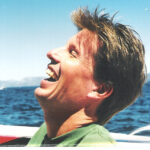An Estuary Where Streams of Work Meet: An Interview with Jeff Reed
Jeff Reed is a pastor and poet located in the Bay Area. He is the author of a number of works, including Estuarial (2014), which is a collection of poems which pair people of wildly different vocations with one another. I interviewed him about what was behind the book and his own thoughts and experiences regarding vocation, work, and community.
Jerome Blanco:
Jeff, in your poetry collection Estuarial, you write poems narrated by people in one vocation speaking to other people in entirely different vocations. “The Plumber to the Shoe Salesman” or “The Ballerina to the Logger,” for instance. What led you to write poems like these? An entire collection of them even!
Jeff Reed:
I tend to see the world through the lens of metaphor. This is how I make sense of things—breaking down complex concepts into accessible and communicable metaphors. This habit of mine has cultivated in me an instinct for building interesting bridges between different things. My assumption underneath all of this is that the world is very interconnected—which makes sense if it is all being held together by Christ!—and that if a person stared long enough at any two objects, no matter how dissimilar or far apart, there would be some discoverable connective tissue between them.
I don’t remember the exact moment that led to the specific Estuarial experiment, but I know it was rooted in this way of having come to see the world.
I remember, a couple of years ago, coming across a funny tweet by Mike Ginn who wrote: “We get it poets. Things are like other things.” He named something at the heart of poetry—this capacity to use language to capture the invisible threads connecting all the disparate pieces of the world to each other. My favorite poet, Gerard Manley Hopkins, once said something similar in a sermon: “We say that any two things however unlike are in something alike.”
“The Plumber to the Shoe Salesman” was the first poem experiment. I was delighted by the conversational flavor that emerged, though each poem only features one speaker addressing the silent other. Tendons and connections between the two wildly different vocations formed as images from each sphere were called up to interact with one another. An interesting—and surprising!—interplay naturally emerged as I played with the lines, and the sheer pleasure of this discovery motivated me to try my hand at it again. Not wanting to force the process, I made a long list of as many professions as I could think of, and then I blindly chose two from the list to put together for another poem, using the exact same structure. I wanted to see if this mysterious connectivity would continue to surface. Sure enough, no matter what two professions were randomly put together, something fresh and new and insightful would emerge from the interaction between the two vocational worlds. I kept going until I had a whole folder full of these poems, and that folder turned into Estuarial.
My assumption underneath all of this is that the world is very interconnected—which makes sense if it is all being held together by Christ!—and that if a person stared long enough at any two objects, no matter how dissimilar or far apart, there would be some discoverable connective tissue between them.
Jerome Blanco:
“Things are like other things”—I love that! Finding connective tissue between different kinds of people seems especially important these days. And it’s a helpful reminder you point out, that since all things are held together by Christ, then those connections must necessarily be there. So, I wonder then, as you spent such intentional time putting such apparently different people and vocations side by side, how did that affect your own views of various people in different fields of work? Were there any professions in these poems that you found especially challenging to understand or empathize with?
Jeff Reed:
I love the notion of highlighting the centrality of ordinariness, and even more, the key role that the seemingly ordinary plays in the great supernatural story. Great novels and movies often use the device of the unlikely hero to win the day in dramatic and ironic fashion. In our day, where there is often an elitist pecking order in the world of vocation, usually based on earning potential, I am drawn to Jesus’s prediction of the last being first, the meek inheriting the earth, and John the Baptist being the greatest in the kingdom of God because of the very fact that he is the least!
Estuarial has reinforced for me this idea that all work, whether manual or mental, blue collar or white collar, is a form of caring for the world—which is at the heart of the original and archetypal mandate for work in Genesis 1:26 with 2:15—and every expression of legitimate work carries this inherent dignity. And in the area of vocation, as in Paul’s great metaphor of the church as a body, it might very well be that the less honorable roles now, from a certain cultural bias, will receive more honor in the end. I’m thinking of 1 Corinthians 12:23-24.
Some of the poems feature stereotypical white collar vs. blue collar engagements—“The English Professor to the Exterminator,” “The Stockbroker to the Truck Driver,” “The Ballerina to the Logger,” “The Scuba Diver to the Advertising Executive”—and the actual effect of these poems is to set both vocations on equal footing, the white collar job being translated by and mirrored admirably by the blue collar job, or vice versa. The effect is to suggest that the two vocations, in fundamental ways, are more similar than different, and that those in either vocational stream can potentially stand as a tutors and mentors to those in the other stream.
To write these poems, I had to enter imaginatively into various vocational worlds, and I trust I did so with humility and respect. In my imagination, I found them to be creative, challenging, and worthy of human investment and sweat and commitment. I must admit there were a few vocations that I used in order to criticize some of the core principles of that kind of work—The Porn Film Director, The Marxist-Leninist, The Fashion Magazine Editor, The Advertising Executive—but by and large, I wrote with great affection as I temporarily descended into the world of crab fishermen, auto mechanics, hair stylists, meter readers, toll booth attendants, and on and on.
I do confess to having had some natural aversion to the phlebotomist, since I get faint at the sight of blood. And my research into the use of young boys as chimney sweeps in the old days was sobering. I also have to add, I do know that if I was called to step into any one of these roles for a day or a week, I would be fully humbled by my inadequacy to drum up the necessary skill required, and for that I tip my hat to all of these different kinds of work, those hard at work making the world hum, making the world a better place.
Estuarial has reinforced for me this idea that all work, whether manual or mental, blue collar or white collar, is a form of caring for the world—which is at the heart of the original and archetypal mandate for work in Genesis 1:26 with 2:15—and every expression of legitimate work carries this inherent dignity.
Jerome Blanco:
Yes, that’s certainly an essential reminder for all of us. I am often—and probably should be more than often—grateful that different people do different things. It’s much too easy to take for granted, but our life and existence as we know it depends on this reality. It calls to mind what Paul says in 1 Corinthians, but, in a sense, on a broader, universal scale. Now, speaking of the intersection of vocational words, you yourself have an interesting vocational situation, being both pastor and, as we see here, poet. Or is it poet and pastor? Could you talk about those roles as they exist alongside each other? Their “estuarial” effect?
Jeff Reed:
I am ambivalent as to which word should come first in my own sense of vocation. I typically use “pastor” as my primary self-identifier because it reflects my formal education, it is how I make my economic living, and it is how I spend most of my working hours. I feel almost shy to refer to myself as a “poet,” seeing that my work is largely unknown, and I have not received recognition from the official cultural gatekeepers of poetry—the prominent publishing houses. And yet, if I am honest, I do feel the vocation of “poet” is more central to my core identity.
To back that up, I would say that I approach pastoring through the lens of the poet much more than I approach poetry through the lens of the pastor. My sermons revolve around metaphor and image, inspired by Jesus’s use of the parable. My sense of the ideal worship gathering is something very much like a poem—a synthesized tapestry of elements making an integrated whole that impacts people intellectually, emotionally, and spiritually. Even in my counseling, or in my leadership, or even in administrative kinds of things, my work is marked with, tinged with, this creative, imagistic, analogy-heavy bent. On the other hand, I do not typically approach writing poetry as a tool to use in my pastoring work. I don’t write poems for church services, or to make Bible teaching points. Most of my poetry is not overtly religious, though I would argue every line of it is deeply Christian.
In practical terms, I have recently pulled back from my full-time role as lead pastor at my church to a ¾ time rhythm, in order to make intentional room for my writing vocation. This includes two additional days a month away from the office, and a large chunk of time away in the summer. My church has been wonderfully supportive of me wanting to live more in the estuary, and I am very grateful for that!
Jerome Blanco:
That sounds like a really good situation to be in! What strikes me about your response is how greater community has influence on our understanding of vocation—as you’ve obviously acknowledged in speaking of Estuarial, but in a broader way too. Positively, you have this supportive church community that actively and practically encourages your vocations. But on another hand, you mention the cultural “gatekeepers” that inevitably affect how you can define your own vocation. Similarly, the very defining values of “what makes money” or “what you’re educated in” are values established by the sociocultural community one finds oneself in. And it really affects how one views one’s own work and vocation. If the influence of community is so instrumental to understanding vocation, what do you think a healthy and thriving community would look like in which a robust theology of vocation can be developed? What does this look like as we work alongside each other? It’s sort of thinking of the church or local community, as a whole, as an estuary, isn’t it?
I think the church can improve on the common cultural message to children from “be whatever you want to be” to “discover how God made you and press your life into stewarding that for the good of the world.”
Jeff Reed:
I love the way you frame that! Thinking of the church community in particular as estuarial seems right on track when we think of the need for the church to disciple healthy Christians engaging the world in a holistic way. A healthy Christian will have an appropriate sense of self—informed by the Gospel—and a clear vision of how to practically give oneself away for the good of the world. That giving away needs to be much more than occasional mission trips and witnessing moments. It needs to be fleshed out in vocation—the specific long-term way a person offers himself or herself up to serve the people and the place in the world where he or she has been placed by God for such a giving.
Toward this end, then, it seems the church as community can do several things: emphasize the goodness of all work in the diversity of its varied manifestations, highlight and celebrate different vocational achievements within its social network, encourage sober self-assessment—beyond simply spiritual gifts—with congruent training, advertise and utilize the diverse gifts and strengths of its people within the social web of the church community, and consciously include a healthy vocational theology in the children’s and youth ministries. And to this latter point, I think the church can improve on the common cultural message to children from “be whatever you want to be” to “discover how God made you and press your life into stewarding that for the good of the world.” That lines up beautifully with the fact that Paul in Ephesians 2:10 calls the church—and, by extension, each of us individually—God’s “workmanship,” which is an English translation of the Greek word “poiema”! See! It all comes back to poetry, says the poet-priest of the little estuary!
Estuarial can found at Wind in the Reeds Publishing, here.
 Jeff Reed (www.windinthereeds.com) serves on the Lead Pastor Team of Hillside Covenant Church in Walnut Creek, CA. He received his DMin from Fuller Theological Seminary in 2010. His thesis explored the use of poetry as a tool to teach theology in the local church. In addition to Estuarial, he is the author of Kore on the Trail of the Tree Keepers, Lamentation of Swans, and several other small volumes of poetry. He lives in Orinda, CA with his wife Susan.
Jeff Reed (www.windinthereeds.com) serves on the Lead Pastor Team of Hillside Covenant Church in Walnut Creek, CA. He received his DMin from Fuller Theological Seminary in 2010. His thesis explored the use of poetry as a tool to teach theology in the local church. In addition to Estuarial, he is the author of Kore on the Trail of the Tree Keepers, Lamentation of Swans, and several other small volumes of poetry. He lives in Orinda, CA with his wife Susan.
 Jerome Blanco is the De Pree Center’s editorial coordinator. He received his MDiv from Fuller Seminary and his MFA from New York University.
Jerome Blanco is the De Pree Center’s editorial coordinator. He received his MDiv from Fuller Seminary and his MFA from New York University.

Jerome Blanco
More on Jerome Blanco

